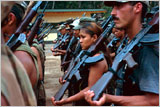|
But
this is also the traditional backyard of the FARC.
Even in theory, the lines between counternarcotics and counterinsurgency
operations are becoming virtually indistinguishable. On the ground
they may now be non-existent -- sparking fears that Washington is
being sucked into another Vietnam-style expeditionary war.
Publicly, U.S. officials stress they will only assist the Colombian
military in anti-drug operations. But behind the scenes they seem
to be looking at the model of El Salvador rather than Vietnam as
a blueprint for what in its widest sense is a campaign to stifle
the guerrillas and save a nation from the risk of partial break-up.
"Salvador was a tremendous success in terms of the goals of
establishing peace, getting democracy and a better economic model,"
said Edwin Corr, U.S. ambassador in El Salvador from 1985 until
1988, the height of the civil war. "In Colombia too we’ve
got some very defined goals. These are to get peace, to make the
constitution more democratic, and to get them out of the economic
doldrums. These are the same goals I upheld in Salvador."
General Fred Woerner, head of the U.S. Army’s Southern Command
during th war in El Salvador, agrees. "The fundamental tactics
and techniques that we employed in Salvador are applicable in Colombia.
Small units, extensive operations day and night, sustainment of
pressure on the guerrillas and denial of safe havens, coverage of
border areas, protection of the population, and absolute respect
for human rights."
In Central America, huge U.S. training and matériel aid packages
had little effect.
Cynthia Watson, strategy expert and associate dean at the National
War College in Fort McNair, Washington D.C., holds to the parallel
with Viet Nam. "Colombia is a much more complex situation than
Salvador." She argues that like successive South Vietnamese
regimes, President Andrés Pastrana’s administration
is increasingly viewed as incompetent and unrepresentative. Pastrana’s
popularity rating has sunk to around 20 percent and for generations
the government in power has made little effort to enact social spending
programs for schools, health, and infrastructure outside the main
urban centers.
A fundamental flaw in the focus of U.S. policy toward Colombia,
Watson argues, is that Washington views Colombia as a state under
threat of breakdown rather than a state still in formation.
"We’re asking the Colombian military to defend a motherland
that doesn’t really exist," Watson said. "The government
in Bogotá is not a legitimate government in many parts of
the country."
|

San
Vicente del Caguán, Colombia.
|
